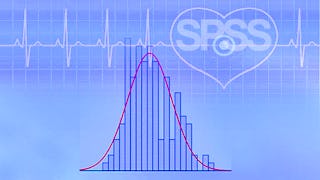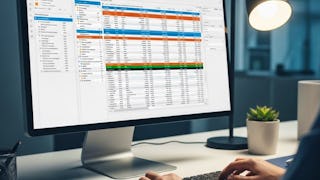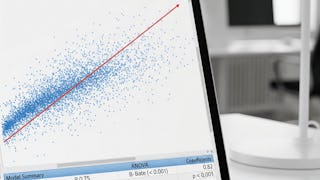- Browse
- Spss
SPSS Courses Online
Learn SPSS for statistical analysis. Understand how to use SPSS for data entry, manipulation, and advanced statistical techniques.
Explore the SPSS Course Catalog
 Status: NewNewStatus: PreviewPreview
Status: NewNewStatus: PreviewPreviewSkills you'll gain: Unsupervised Learning, SPSS, Statistical Machine Learning, Applied Machine Learning, Machine Learning, Machine Learning Algorithms, Statistical Analysis, Data Mining, Data Cleansing, Data Analysis, Data Manipulation, Statistical Methods
5·Rating, 5 out of 5 stars13 reviewsMixed · Course · 1 - 4 Weeks
 Status: PreviewPreviewP
Status: PreviewPreviewPPeking University
Skills you'll gain: Statistical Hypothesis Testing, SPSS, Statistical Analysis, Statistical Methods, Sampling (Statistics), Descriptive Statistics, Correlation Analysis, Regression Analysis, Probability & Statistics, Statistics, Quantitative Research, Data Analysis Software
4.6·Rating, 4.6 out of 5 stars159 reviewsMixed · Course · 1 - 3 Months
 Status: NewNewStatus: PreviewPreview
Status: NewNewStatus: PreviewPreviewSkills you'll gain: SPSS, Correlation Analysis, SPSS (Software), Regression Analysis, Predictive Modeling, Predictive Analytics, Statistics, Descriptive Statistics, Statistical Methods, Statistical Modeling, Case Studies, Statistical Analysis, Data Import/Export, Data Manipulation, Analysis
Mixed · Course · 1 - 3 Months
 Status: NewNewStatus: PreviewPreview
Status: NewNewStatus: PreviewPreviewSkills you'll gain: Data Presentation, Regression Analysis, Predictive Modeling, Financial Forecasting, Statistical Modeling, Forecasting, Financial Modeling, SPSS, Predictive Analytics, Risk Modeling, Statistical Analysis, Analytics, Scatter Plots, Credit Risk, Microsoft Excel
Mixed · Course · 1 - 4 Weeks
 Status: Free TrialFree TrialY
Status: Free TrialFree TrialYYonsei University
Skills you'll gain: Apache Spark, Augmented Reality, Cloud Computing Architecture, Big Data, Wireless Networks, SPSS (Software), SPSS, Augmented and Virtual Reality (AR/VR), Cloud Computing, Internet Of Things, Live Streaming, Cloud Platforms, Analytics, Real Time Data, Telecommunications, Multimedia, Emerging Technologies, Mobile Development, Apple iOS, Display Devices
4.7·Rating, 4.7 out of 5 stars2K reviewsBeginner · Specialization · 3 - 6 Months
 Status: Free TrialFree TrialY
Status: Free TrialFree TrialYYonsei University
Skills you'll gain: Apache Spark, Big Data, SPSS (Software), SPSS, Analytics, Real Time Data, Apache Hadoop, Data Processing, Business Analytics, Statistical Analysis, Data Analysis Software, Business Strategy, Market Share, Scalability, Machine Learning Algorithms
4.7·Rating, 4.7 out of 5 stars309 reviewsBeginner · Course · 1 - 3 Months
What brings you to Coursera today?
 Status: FreeFreeT
Status: FreeFreeTThe Chinese University of Hong Kong
Skills you'll gain: Analysis, Statistical Modeling, Regression Analysis, Statistical Analysis, Quantitative Research, Correlation Analysis, SPSS, SAS (Software), Data Modeling, Data Analysis Software
4.8·Rating, 4.8 out of 5 stars25 reviewsMixed · Course · 3 - 6 Months
 Status: PreviewPreviewU
Status: PreviewPreviewUUniversidades Anáhuac
Skills you'll gain: Regression Analysis, Market Research, Data Analysis, Marketing Analytics, Business Intelligence, SPSS, Statistical Analysis, Data-Driven Decision-Making, Data Mining, Quantitative Research, Business Marketing, Market Analysis, Consumer Behaviour, Microsoft Excel
Beginner · Course · 1 - 3 Months
In summary, here are 8 of our most popular spss courses
- SPSS: Apply & Evaluate Cluster Analysis Techniques: EDUCBA
- 医学统计学与SPSS软件(基础篇): Peking University
- Predictive Analytics with SPSS: Analyze & Apply: EDUCBA
- Linear Regression & Predictive Modeling with SPSS: EDUCBA
- Emerging Technologies: From Smartphones to IoT to Big Data: Yonsei University
- Big Data Emerging Technologies: Yonsei University
- Structural Equation Model and its Applications | 结构方程模型及其应用 (粤语): The Chinese University of Hong Kong
- Ciencia de Datos Aplicada al Marketing: Universidades Anáhuac
Skills you can learn in Probability And Statistics
Frequently Asked Questions about Spss
SPSS is a common software used by data analysts to conduct statistical data analysis. The designation SPSS is short for Statistical Package for the Social Sciences. While no longer just used in social science, SPSS is today a common tool for education, marketing, and healthcare researchers to perform statistical analysis and statistical operations. Among the types of data analyzed using SPSS by researchers include scientific research results, Google analytics, server log files, survey results, and organization customer databases. SPSS software, which has been owned by IBM for over a decade, supports spreadsheets, plain text files, and relational databases like SAS, SATA, and SQL. In fact, almost all kinds of formats of structured data are supported by SPSS software.
It's valuable to learn SPSS as it may give you graphical insights into how to manage data, conduct data mining, select data cases, recode variables, and manage research surveys. Learning SPSS can also help provide quick data analysis with accurate information about variables and cases. The SPSS software also includes charts and graphs, which makes it easy to share and show data findings. These are valuable assets to learn and to use in your professional career. SPSS software can simplify and speed up your data analytics work through its menu-driven UI that gives you data insights with a few clicks.
Typical career opportunities that use SPSS are mainly jobs like data analysts, research analysts, and intelligence analysts. These roles may be in government work, research, healthcare, science, education, and marketing. You may even use SPSS understanding to work as an SPSS software instructor. In many of these roles, your knowledge of SPSS would help you conduct data management, data analysis, and research functions for your organization, to help provide meaningful insight for the enterprise.
When you take online courses on Coursera about SPSS, you may learn the basics of using the SPSS software and the fundamentals of statistical theory and design, as well as how to create variables, how to enter data, and how to modify properties of variables in common statistical tests. Having a basic understanding of data and statistics may help you enrich your learning of SPSS in a faster way. It may also speed up your learning of how SPSS is used in quantitative research models and other statistics formulations.










